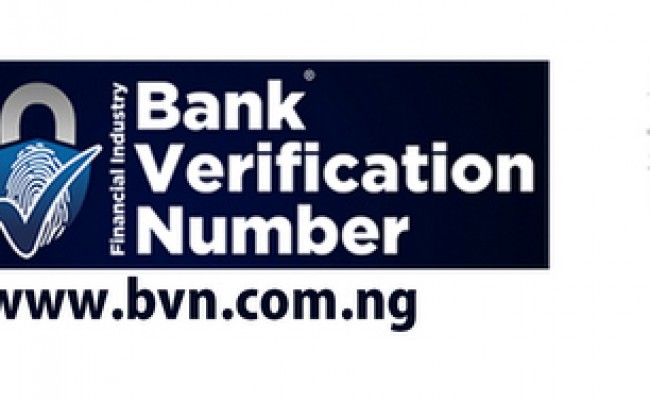- 51.72m Bank Customers Enrolled on BVN as at February
The total number of bank customers that now have Bank Verification Number (BVN) has increased to 51.72 million as at February 2017.
Data compiled from the Nigeria Interbank Settlement Systems Plc’s (NIBSS) website, showed that as at January 2017, the number of bank customers that had obtained their BVN stood at 50.92 million.
The data showed that on monthly basis, the enrolment on BVN has continued to improve steadily.
For instance, as at January last year, 30.13 million customers had gotten their BVN, compared with the 2.24 million it was as at January 2015. Also, enrolment increased further to 31.11 million as at February last year (2.71 million as at February 2015); 32.19 million as at March last year (3.34 million as at March 2015); 33.63 million as at April 2016 (7.71 million April 2015); 35.44 million as at May last year (9.2 million as at May 2015); and 36.12 million as at June 2016 (12.49 million as at June 2015).
Furthermore, the data showed that enrolment on the BVN platform sustained its uptick as at July last year, when it climbed to 36.79 million registered bank customers (12.73 million as at July 2015); 46.39 million in August 2016 (13.74 million in same month in 2015); 47.35 million in as at September 2016 (14.58 million as at September 2015); and 48.14 million customers as at October last year. BVN enrolment was also at 49.14 million as at November last year and 49.99 million as at last December.
The BVN has been very helpful in the fight against corruption in the country, especially since the federal government whistle-blowing policy was unveiled last December.
For instance, through BVN, Bankers, mainly account officers, have been taking advantage of the whistleblowing policy to report the wrongdoings of former and current public office holders suspected to have embezzled public funds and stashed them in several Nigerian banks, investigations recently revealed.
A reliable source with the Economic and Financial Crimes Commission (EFCC) had revealed that some bankers have been encouraged largely by the reward of between 2.5 per cent (minimum) and five per cent (maximum) of the total amount recovered.
According to the source, several former and current public officers who had allegedly stolen from the treasury either hid the physical cash in safe houses or used shell companies, close aides, associates and family members to stash the ill-gotten funds in bank accounts using the names of the companies or their friends, family members and associates.
However, though the accounts are not in the names of the political office holders, they usually operate the accounts themselves, a fact that is well known by the bank account officers who help them to manage the accounts.
As a result, since the federal government unveiled the whistleblowing policy as a means of recovering stolen public sector funds, a number of junior and middle-level bankers have been quietly ratting on the true beneficiaries of the accounts in order to cash in on the rewards derivable from the policy.
The EFCC source said that once the commission is contacted by a banker, it is usually easy to identify the real beneficiary of the bank accounts through the BVN, since an account holder can only have one BVN for all of his individual and company accounts.
The Central Bank of Nigeria (CBN), in collaboration with the Bankers’ Committee had introduced the BVN on February 14, 2014. The initiative was aimed at ensuring unique identity for all bank customers and other users of financial services in the country by the use of the customers’ biometrics as means of identification.
The BVN is a number that enables one person to have a single identity in the banking system. It basically ensures that a customer’s identity is not stolen. It has been described as a ‘silver-bullet solution’ to many of the challenges in the banking industry. A customer is only expected to register at one bank, irrespective of the number of accounts he has.
Certain forms of identification are easy to counterfeit, which had led to a rise in identity theft today. But by making use of the BVN biometrics technologies, the banking industry would enjoy enhanced security, providing consumers with better security that protects their money, financial information and identity.
According to a report by the Alliance for Financial Inclusion, there are many advantages associated with secure, unique identification. The primary effect will be improved access to financial services, enabling people to benefit from credit and savings facilities.
Research has also shown that proper customer identification can have a positive effect on the behavior of risky users of financial services. The scheme is also expected to improve the banking system’s Know-Your-Customer (KYC) requirements as stated by the Financial Action Task Force (FATF) as well as to support innovative banking solutions, especially for retail banking.
The CBN Governor, Mr. Godwin Emefiele recently explained that the BVN solution would stimulate banking transactions and also improve access to credit by customers. Emefiele noted that with the BVN, the banking industry would begin to see the opening up of consumer credit opportunities.
He said: “We are saying that with this project people who want to buy cars, want to do mortgage with the kind of data that would be fed into the centralised system and it should be possible for you to access bank credit easily.”
Meanwhile, the NIBSS data showed that the total number of bank accounts was 95 million as at November 2016. But the total active bank accounts were 64.13 million as at November.

 Naira4 weeks ago
Naira4 weeks ago


 Naira4 weeks ago
Naira4 weeks ago


 Naira3 weeks ago
Naira3 weeks ago


 News4 weeks ago
News4 weeks ago
 Travel4 weeks ago
Travel4 weeks ago




 Naira4 weeks ago
Naira4 weeks ago


 Jobs3 weeks ago
Jobs3 weeks ago
 Naira3 weeks ago
Naira3 weeks ago






















